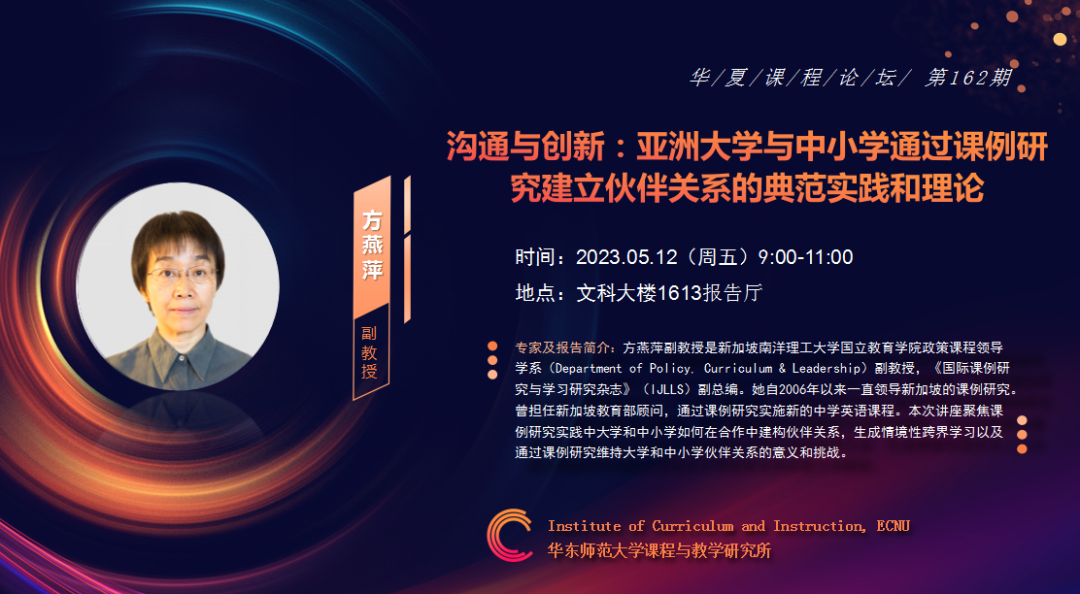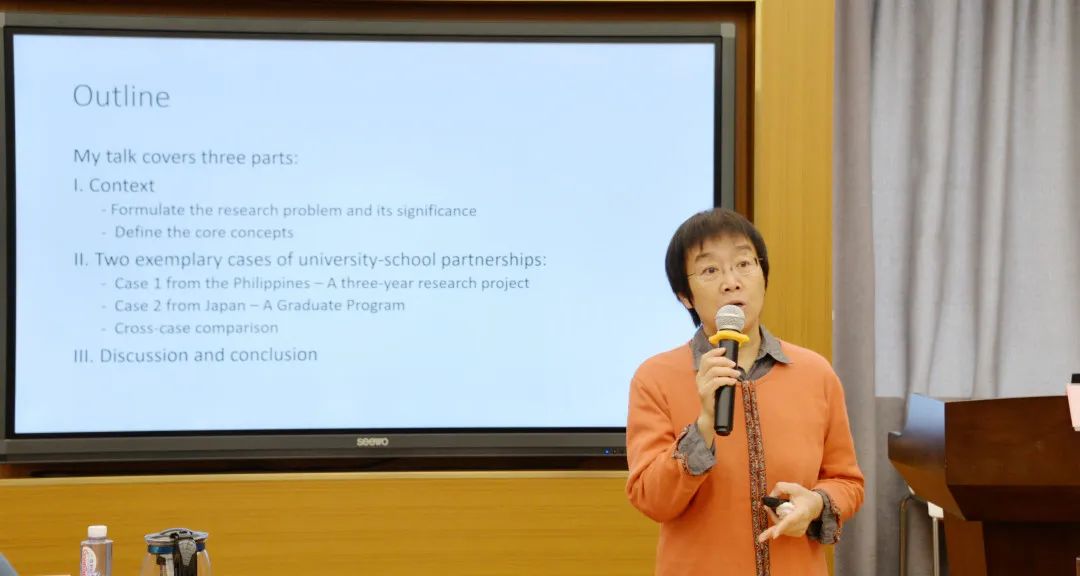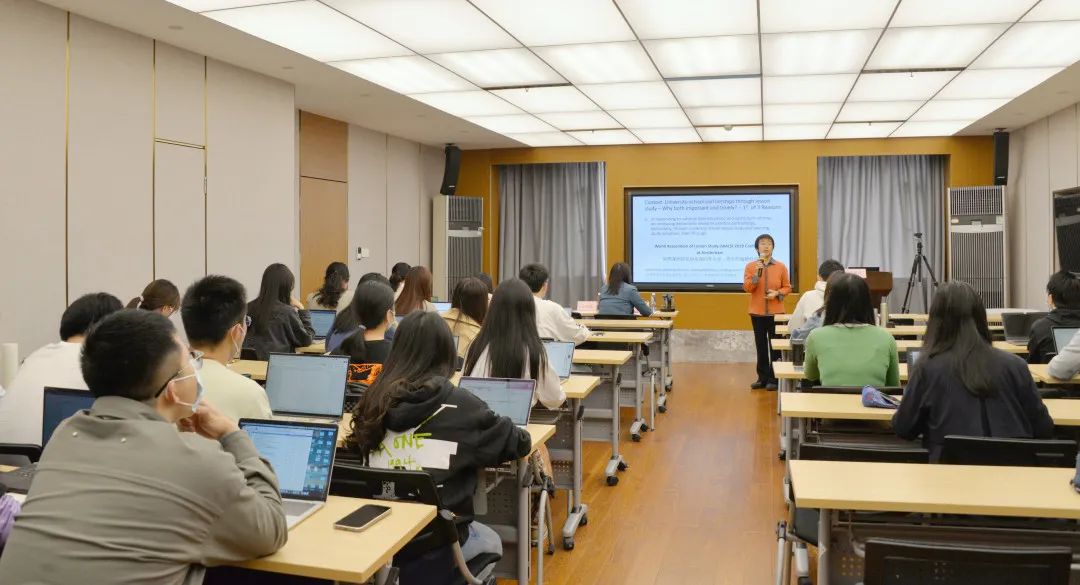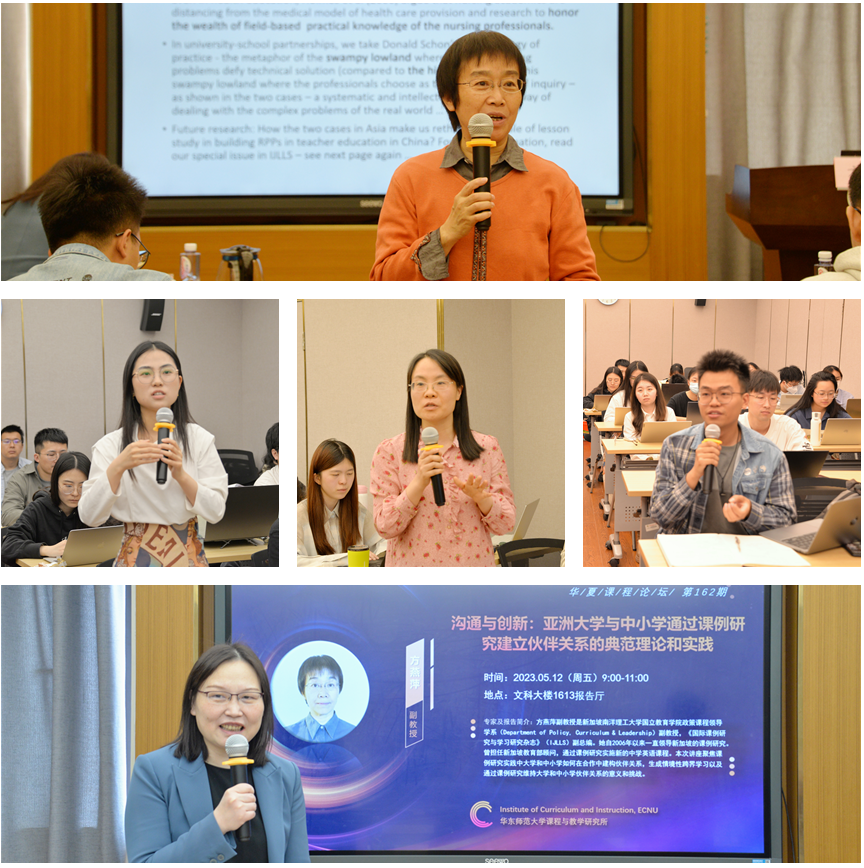ICI 162nd Huaxia Curriculum Forum ║Communication and Innovation: Classical Practices and theories of Partnerships between Asian Universities and Primary and Secondary Schools Established Through Lesso
2023-06-01
On the morning of May 12, Associate Professor Fang Yanping, Department of Policy Curriculum Leadership, National Institute of Education, Nanyang Technological University, Singapore, guested at the 162nd session of the Huaxia Curriculum Forum, and made a speech entitled "Communication and Innovation: Classical Practices and theories of Partnerships between Asian Universities and Primary and Secondary Schools Established Through Lesson Studies".The forum was chaired by Professor An Guiqing from the Institute of Curriculum and Instruction, East China Normal University, and attracted many teachers and students to participate in the study and discussion.

Associate Professor Fang Yanping first pointed out that it is important and timely for universities and primary and secondary schools to establish partnerships based on lesson studies in order to respond to the demands of governments for education reform and curriculum reform. As a result, academic publications on lesson studies have increased significantly in recent years. However, these studies and their practices generally take the partnership between universities and primary and secondary schools in lesson studies as a natural structure or tool, and pay little attention to how this partnership promotes lesson studies, and how the two partners learn from each other to build a bridge between research and practice. To solve this problem, she edited a special issue entitled "Research-Practice Partnerships (RPP) in Asia-Bridging the Gaps through Lesson Study" for the Asia Pacific Journal of Education, including cases from 8 countries and regions in Asia, which was published in March 2022.
This report focuses on the two exemplary practices of lesson studies in the Philippines and Japan in the special issue, and reveals how these two types of exemplary partnerships in Asia can learn from each other through successful design and operation from the perspective of boundary-crossing theory and construct reflective practical knowledge needed for reform.
She regards lesson studies as the encounter between university researchers and school teachers at the boundary of research and practice, and clarifies the core elements in the theory of transboundary learning, that is, the roles played by researchers—translation, communication and transformation, and boundary infrastructure—brokering, boundary practices, boundary objects. By clarifying the core concepts, two exemplary practices from the Philippines and Japan are presented and analyzed from the following three aspects:
First, how universities can strengthen border infrastructure and promote cross-border through design and innovation;
Second, what does a system's effective border infrastructure include;
Third, how "research" facilitates cross-border communication for problem-solving oriented learning.
After the two cases are described, a cross-case comparison is made, and it is pointed out that the Philippine case is a practical opportunity to develop teachers' research identities by consolidating school teachers' proposals, design and research on problems during the project, and extending development after the project to guide teachers to continue to carry out research and to develop recognition of teachers as researchers; while the Japanese university-school cooperation model develops a closely coupled partnership based on a high degree of dependence between research and practice by using the school as a base for university scientific research and teacher training. What these two cases have in common is the careful design of the system to ensure the safe implementation of a rich cross-border mechanism to support the learning of both parties.

Based on the case analysis, Associate Professor Fang Yanping further pointed out that only doing case studies is not enough to respond to the existing educational reform needs. The construction of an effective and sustainable partnership between"university-primary and secondary school" and "research-practice" should and can be deliberately designed as a mutual learning between teachers and teacher educators. The key is to be guided by the principle of practice itself to guide subject learning and teaching research, and guide the two parties to learn by doing; at the same time, the cross-border interaction mechanism contained in the case study itself should be developed. In cross-border activities, different participants with different knowledge and perspectives interact with each others to problematize learning context and use evidence from research to continually improve design, observation, analysis, interpretation, and decision-making. In view of the tradition of Asian culture dominated by expert knowledge, Associate Professor Fang Yanping also pointed out that in the future, efforts should be made to build a more democratic and equal dialogue and participation system, while paying full attention to the research on teachers' emotions and resilience.

In the end, Associate Professor Fang Yanping ended the report with the metaphor in Donald Schon’s theory of practical epistemology.
In the cooperative relationship between universities and schools, compared with the ivory tower highland of university theoretical research, the swampy lowland of primary and secondary school practice is full of messy and confusing problems. As shown in the two cases, professionals should choose this swampy lowland as habitat for research, and be grounded in practice to solve complex problems in the real world of education.
Associate Professor Fang Yanping's research on the establishment of partnership between universities and primary and secondary schools through lesson studies aroused strong interest in discussions and exchanges among teachers and students present. In the follow-up question-and-answer session, the participating teachers and students conducted discussions on issues such as "how to cultivate the transformation ability of researchers", "how to establish an equal relationship between university researchers and primary and secondary school teachers", and "how to promote the construction of cross-border infrastructure in reality".
